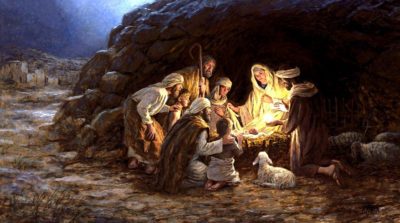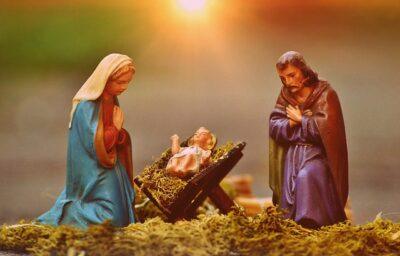The following post The True Christmas Story Of Our Messiah, Savior, And Hero is courtesy of http://totalsurvival.net
Come, Thou long-expected Jesus / Born to set Thy people free.
— Charles Wesley, “Come Thou Long Expected Jesus” (1744)
The Redeemer has broken every bond: / The Earth is free, and Heaven is open.
— Placide Cappeau, O Holy Night, (1847)
In The Beginning
In the beginning, God created the heaven and the earth. Then God created man in His own image. He gave us the world and promised us life and joy. But we rebelled against God’s word. Adam chose to place his own interpretation on reality, an interpretation shaped by his inward desire to be his own god.
God could have destroyed man and his world on that day. But instead, He made a promise. A Hero would come to reconcile God to man and man to God (Gen. 3:15). And as a sign and seal of that promise, God sacrificed animals… probably lambs… and clothed our first parents with their skins.
As the faithful thought about that sacrifice, as they repeated it year after year, they should have seen that the sacrificial lamb died in the place of rebels. The lamb was a representative, a substitute of sorts. Through the sacrificial lamb, God was promising reconciliation and peace through a substitute.
But the lamb itself was not the substitute. After all, the slaughter of lambs and goats and bulls would go on for 4,000 years. Every sacrifice pointed to the Substitute, but no animal sacrifice was the Substitute. The faithful could have reasoned that the promised Hero would be the Substitute, but that would be an incredible conclusion because the Substitute had to die. But heroes never die in a good story… do they?
Waiting For The Messiah
 Two thousand years after God gave His first promise, He called Abraham out of the city of Ur in Mesopotamia and led him to the land of Canaan — what we call Palestine. Following this, God gave him a promise. Abraham would become the channel through whom God would bless the whole world. “In thy Seed shall all the nations of the earth be blessed” (Gen. 22:18). Abraham would be the ancestor of the great Hero who would restore the world to God’s blessing.
Two thousand years after God gave His first promise, He called Abraham out of the city of Ur in Mesopotamia and led him to the land of Canaan — what we call Palestine. Following this, God gave him a promise. Abraham would become the channel through whom God would bless the whole world. “In thy Seed shall all the nations of the earth be blessed” (Gen. 22:18). Abraham would be the ancestor of the great Hero who would restore the world to God’s blessing.
To confirm this promise, God swore an oath to Abraham. In a terribly stark but powerful ceremony, God swore unilaterally that He would not let His promise fail… that He Himself would die rather than let His promise fail (Gen. 15). There was a hint here. Later, God imposed the bloody rite of circumcision on Abraham and his descendants. Circumcision pointed to the necessity of God’s saving grace. There could be no hope in natural generation. The flesh could only produce the flesh. The promised Seed, Hero, and Substitute would be born through the power of the Holy Spirit.
Abraham, of course, was the ancestor of the Jewish people. And for 2,000 years their prophets and seers drew word-pictures of the coming Hero:
He would be the Seed of Abraham, of the tribe of Judah, of the seed of David. He would be born of a virgin, in Bethlehem of Judea (Isa. 7; Mic. 5). He would appear “70 weeks” of years after Cyrus ordered the Temple rebuilt (Dan. 9). He would arrive in the days of the fourth great world empire, the one that succeeded Babylon, Persia, and Greece (Dan. 2). He would come when Rome ruled the world.
The Hero, the Substitute, would be God’s Anointed, His Messiah. He would be a Prophet like Moses, a Priest like Melchizedek, a King greater than David. He would sit at God’s right hand, ruling in justice, wrath, and mercy. His government and peace would fill the earth (Isa. 9). All kings would bring Him tribute; all nations would serve Him (Ps. 72).
And yet this great Hero, this Messiah, would be despised, rejected, afflicted — without comeliness, without beauty (Isa. 53). His own people would conspire with the Gentiles to destroy Him (Ps. 2). He would be betrayed by His friend, deserted by His disciples, surrendered to the Gentiles, numbered with criminals, mocked by His enemies, pierced in His hands and feet, hung on a tree, slain, and buried in a borrowed tomb.
And on the third day, He would rise from the dead and take His seat at God’s right hand (Ps. 110).
With this picture of the Messiah fully drawn, the prophets fell silent and 4,000 years passed.
The Child Is Born

Image source: Pixabay.com
Finally… in the fullness of time… when Augustus was emperor, when Herod the Great was king of Judea… when pagan idolatry and Greek philosophy had not simply failed but carried culture into the depths of depravity… the Messiah came (Matt. 1-2; Luke 1-2). They called Him “Jesus.” He was born by miracle, born of a virgin without the interference of a human male. He was born in innocence and holiness. He was born the incarnate Son of God.
Incarnation. What a word! And on it, the whole promise of reconciliation turns. God Himself becomes the Hero. God became man. He took to Himself a true human nature. And yet He remained God, eternal deity: one Person, two natures. “The Word became flesh, and dwelt among us” (John 1:14).
The creeds of the Church put it this way:
I believe. . . in one Lord Jesus Christ, the only-begotten Son of God, begotten of the Father before all worlds; God of God, Light of Light, very God of very God; begotten, not made, being of one substance with the Father, by whom all things were made; who, for us men for our salvation, came down from heaven, and was incarnate by the Holy Spirit of the virgin Mary, and was made man (Nicene Creed).
. . . [W]e teach men to acknowledge one and the same Son, our Lord Jesus Christ, at once complete in Godhead and complete in manhood, truly God and truly man, consisting also of a reasonable soul and body; of one substance with the Father as regards his Godhead, and at the same time of one substance with us as regards his manhood; like us in all respects, apart from sin; as regards his Godhead, begotten of the Father before the ages, but yet as regards his manhood begotten, for us men and for our salvation, of Mary the Virgin, the God-bearer; one and the same Christ, Son, Lord, Only-begotten, recognized in two natures, without confusion, without change, without division, without separation. . . (Formula of Chalcedon).
This Jesus is the Messiah, the Savior, the Hero. No other.
Because Jesus was truly man, He could suffer and die in the place of men. Because He was truly God, His life was of infinite value and He could bear all of God’s wrath against sinners.
The Belgic Confession (1561) summarizes the Gospel with these words:
We believe that God, who is perfectly merciful and just, sent his Son to assume that nature, in which the disobedience was committed, to make satisfaction in the same, and to bear the punishment of sin by his most bitter passion and death. God therefore manifested his justice against his Son, when he laid our iniquities upon him; and poured forth his mercy and goodness on us, who were guilty and worthy of damnation, out of mere and perfect love, giving his Son unto death for us, and raising him for our justification, that through him we might obtain immortality and life eternal.
Jesus died on the cross in the place of guilty sinners. The third day He rose again. He returned to life to give life to His people. Christ ascended to heaven and sat down at the Father’s right hand. He is Lord of all, and He reigns with truth and grace. Jesus forgives sins and changes lives. He frustrates and destroys His enemies. Our Savior directs history, in all its details, toward the peace and blessedness the prophets foretold. Those who trust in Him have peace with God now and an eternal place in His kingdom.
This is the meaning of Christmas.
The post The True Christmas Story Of Our Messiah, Savior, And Hero appeared first on Off The Grid News.
This Article Was Originally Posted On offthegridnews.com Read the Original Article herecheck out the full article Here: The True Christmas Story Of Our Messiah, Savior, And Hero
No comments:
Post a Comment